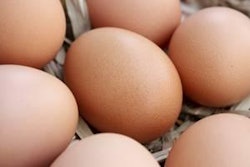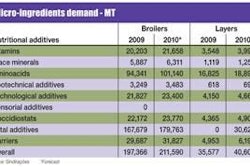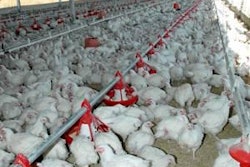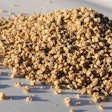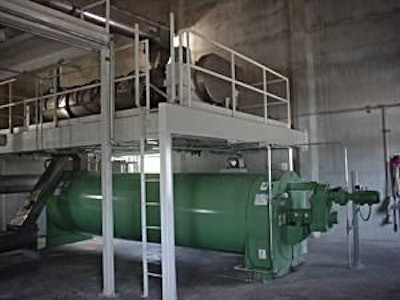
Poultry company Aviagen’s feed mill in Athens, Alabama, may seem typical from the outside, but its interior tells a different story. Before entering the production facility, all visitors allowed to enter clean or secured areas must shower thoroughly, leaving behind the clothes they were wearing when they arrived. They emerge in a biosecure facility wearing clean garments and shoes that have not been exposed to the world they left.
Controlling variables in pellet production
In 1997, Aviagen opened the first US poultry feed mill designed to prevent contamination from enteric pathogens such as salmonella. Delivering some 1,350 tons of pelletized and crumbled feed per week, the mill serves the company’s 115 poultry breeding farms in North Alabama and its pedigree operation in Tennessee.
Setting a new standard for hygienic feed production, the Athens mill represents a multimillion-dollar investment to help the company’s farms produce healthy, fast-growing breeders that pass on superior broiler traits, while supporting breeders’ rapidly evolving food safety initiatives.
Ensuring best practices in feed mill hygiene also helps to produce high-performing, nutrient-rich feed. The key to achieving both is to leave as little as possible to chance by exerting maximum control over the variables that can impact pellet quality and biosecurity.
Environment
Movements of people and product throughout the 14,330-square-foot facility are carefully controlled. Birds, insects, rodents, dust – any external input holds the potential to contaminate the feed. Without special precautions, the chance of pathogens cross-contaminating mash or finished pellets would be unacceptably high.
For this reason, all air movement throughout the plant are separated, and air to the outside is constantly filtered. Each stage of production, from mixing mash to conditioning the mixture to pelleting and cooling, is served by its own ventilation and filtration environment. Each environment is separate from those that precede or follow it. It takes commitment and a lot of work, but it’s necessary to reduce and/or eliminate the risk of cross-contamination.
Ingredients
Quality management starts at the very source, with feed ingredients. The company requires its suppliers to adhere to rigorous quality and cleanliness standards. For instance, corn – a primary ingredient in poultry feed in the US – must be naturally dried and meet strict moisture levels.
Ingredient specifications are posted at the Athens receiving dock and any deliveries failing to meet them are immediately turned away (In the three weeks prior to the writing of this article, two corn deliveries were rejected). Near Infrared Spectrometry (NIRS) analysis on samples of all incoming bulk ingredients – such as corn, soybean meal, corn gluten meal, and wheat middlings – informs inspectors immediately if ingredients fall short of specification.
Aviagen also maintains close control over bagged ingredients, such as vitamins, liquids and free minerals. Finally, the mill uses only plant products in its feed.
Production
Pelleted feed production processes are always evolving, and the variables that impact pellet quality are under constant evaluation.
At any given time, the mill produces six to eight different poultry diets, with each diet requiring a unique combination of input variables, including fat content, heat, moisture, steam quality, pressure and retention time. Each of these inputs can influence starch gelatinization, which is the most crucial step toward ensuring the starches in the feed mash create the strong bonds necessary to form durable pellets. To achieve Aviagen’s minimum Pellet Durability Index (PDI) of 90%, the Athens feed mill constantly monitors and adjusts these inputs.
When one variable changes, others can change as well. For instance, fat content varies by diet. But because fat has a tendency to insulate feed particles, higher-fat recipes – such as pellet diets for broiler starters and broiler growers – can make it harder to create a durable pellet. As a result, adjustments must also be made to grind size, moisture, heat and steam levels so moisture can permeate the fat and reach the core of each particle, enabling starch to fully gelatinize without degrading pellet quality.
The key to achieving this is longer conditioning, and here Aviagen continues to break new ground. Earlier this year, it invested in a high-volume Hygienizer, or heat extender system, to increase its output from 24 to 32 tons of finished pellets per hour. The new system enables the mill to keep pace with the growing demand for feed from its poultry farms, without sacrificing its enteric pathogen intervention efforts and the ISO 9002 certified production processes it has maintained for years.
The Hygienizer uses a conditioning or retention vessel that serves two important purposes for quality control. By holding the feed longer in hot, moist conditions, it helps to eliminate pathogens, while providing an environment that allows starches in even high-fat diets to form an optimal bond. The first conditioning step is to add steam for two minutes, which is followed by at least four minutes in the retention vessel. The longer the mash sits in this heated, pressurized environment, the greater the gelatinization. Meanwhile, extreme heat helps kill bacteria that can pose a threat to poultry.
The investment has allowed Aviagen to increase its feed output by 33%, and of further benefit, the new system uses less energy. For instance, the mill captures 360-degree exhaust from its boiler and routes it through a Direct Contact Economizer, which uses the exhaust to heat water to 150 degrees for use in conditioning - an efficient way to input hot water into the conditioning stage without paying to heat it. As a result, Aviagen uses 12% less steam and reduces its natural gas consumption. The exhaust that finally leaves the plant is 95- 97 degrees, far cooler than when it first left the boiler.
After leaving the Hygienizer, the mash moves to the pelleting process, and finally to the cooling room. The final production step is to spray the pellets with an organic acid that encapsulates and seals each pellet from the atmosphere – yet another way to protect the safety and quality of pellet feed.
Testing
The Athens mill regularly sends finished feed samples to Aviagen’s veterinary services laboratory in Elkmont, Alabama. The lab runs a microbiological assay for the presence of all types of bacteria and coliform.
Because salmonella behaves like a coliform bacteria, Aviagen uses overall coliform counts as a marker to see if salmonella could be present. By keeping to fewer than 10 coliforms per gram of feed, the risk of contamination from enteric pathogens is effectively contained. Throughout production and testing, the standards outlined by the USDA’s National Poultry Improvement Program (NPIP) are met or exceeded.
Transportation
Feed from the Athens mill travels to farms in dedicated vehicles owned, operated and maintained by Aviagen. The trucks, which are cleaned and disinfected regularly to prevent cross-contamination, deliver feed to breeder farms, which are required to keep their feed in enclosed facilities that are not exposed to pathogen conduits. Meanwhile, each load of pellets or crumbles is eaten in a matter of days.
In today’s global poultry industry, ensuring quality involves much more than producing pellets with a high PDI. A growing emphasis on biosecurity requires careful process management, innovative thinking and, perhaps above all, unwavering diligence.


